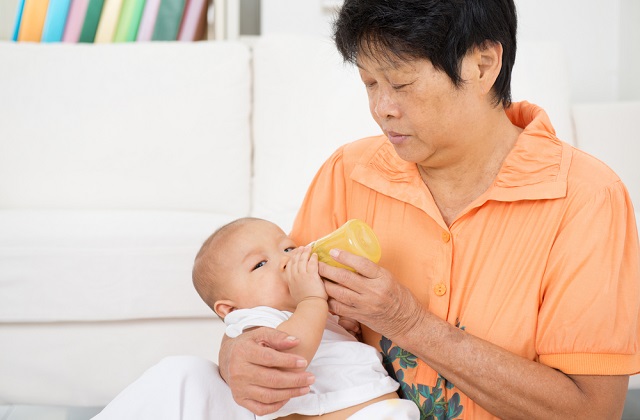Breastfeeding:What to do when nursing mother is sick
In most cases, you can continue to breastfeed when you are sick. However, nursing mother should be cautious about the use of the medicine as some medicines may lower the breast milk supply and some medicines may cause diarrhea, vomiting, and unusual sleepiness or irritability in babies. For example, drugs like Clonidine (Catapres), Chlorthalidone which are used to treat high blood pressure will lower breast milk production.
Most probably, you had exposed the baby to your illness the day before you began showing symptoms. And since your body is mounting an immune response, you can pass those illness-fighting antibodies to your baby through breast milk, which will help protect him.
1. Inform doctor that you're breastfeeding
First and foremost, whenever you need to visit doctor for treatment of your illness, make sure you inform your doctor that you are breastfeeding. This can help your doctor to prescribe medicine that is safe for breastfeeding.
2. Use the over-the-counter medicine with caution
Whenever possible, you should try to consult doctor when you are sick. If you like to use some over-the-counter medicine to cure minor illness, please read the instruction about the medicine very carefully as many of them may not be suitable to mother who is breastfeeding. If you have any doubt about the medicine, you should always check with your doctor or pharmacist.
You may refer to below for a list of drugs that are considered to be safe.
3. Catch cold and flu
Flu is a common disease. Unless advised by your doctor, you can continue to breastfeed your child. You may consider wearing a mask to prevent spreading of the virus to your child through saliva while you are breastfeeding him or her. It is true that the virus that cause flu may be found in the breast milk, but there are also antibodies found in the breast milk that can help your baby to fight against the virus.
4. You still need to pump out breast milk regularly
If you are really worried that you may pass the illness to your child through breast milk and decide to discontinue breastfeeding, you should use a breast pump to pump out the breast milk. This is to ensure that your breast will not be swollen and also ensure the supply of the breast milk is not affected so that you can continue to breastfeed your child once you recover.
5. Discontinue breastfeeding if you contract serious illness or are taking birth control pill
If you are taking pill to avoid pregnancy, you should discontinue breastfeeding.
If the mother had contracted some serious diseases such as lung disease, mastitis, heart disease, kidney disease and diabetes, mother should discontinue breastfeeding.
6. Best thing to do when you are sick
The best thing to do when you are sick is to continue to breastfeed your baby. When you have a contagious illness such as a cold, flu, or other mild virus, your baby most likely had been exposed to the illness before you show any symptoms of illness. By the time you show symptom of illness, your immune system should have produced illness-fighting antibodies. When you continue to breastfeed, you will also pass these illness-fighting antibodies to your baby.
7. Prevent baby from getting sick
You can also take measures to prevent baby from getting sick by doing the usual things to prevent the spread of illness: washing hands often with soap, avoiding sneezing/coughing on baby and ensure good ventilation at home.
8. Drugs that are considered safe to take when breastfeeding
These medications are considered safe to take in standard doses when you're nursing.
|
Name of Drug (Brand Name) |
Use |
|
Acetaminophen (Tylenol) |
Pain reliever |
|
Acyclovir and valacyclovir (Zovirax, Valtrex) |
Antiviral for herpes infections |
|
Antacids (Maalox, Mylanta) |
Used to treat upset stomachs |
|
Bupivacaine (Marcaine) |
Local anesthetic |
|
Cephalosporins (Keflex, Ceclor, Ceftin, Omnicef, Suprax) |
Antibiotics for lung, ear, skin, urinary tract, throat, and bone infections |
|
Clotrimazole (Lotrimin, Mycelex) |
Used to treat yeast and fungal infections |
|
Corticosteroids (Prednisone) |
Used to treat inflammation of joints and other conditions |
|
Decongestant nasal sprays (Afrin) |
Used to treat stuffy noses |
|
Digoxin (Lanoxin) |
Used to treat heart problems |
|
Erythromycin (E-Mycin, Erythrocin) |
Used for skin and respiratory infections |
|
Fexofenadine (Allegra) |
Antihistamine for allergies and hay fever |
|
Fluconazole (Diflucan) |
Used to treat yeast infections |
|
Heparin |
Used to keep blood from clotting |
|
Ibuprofen (Motrin, Advil) |
Used for pain relief |
|
Inhalers, bronchodilators, and corticosteroids(Albuterol, Vanceril) |
Used for asthma |
|
Laxatives, bulk-forming and stool softening(Metamucil, Colace) |
Used to treat constipation |
|
Lidocaine (Xylocaine) |
A local anesthetic |
|
Loratadine (Claritin) |
Antihistamine for allergies and hay fever |
|
Low molecular weight heparins (enoxaparin, dalteparin, tinzaparin) (Lovenox, Fragmin, Innohep) |
Anticoagulants |
|
Miconazole (Monistat 3) |
Used to treat yeast infections |
|
Penicillins (Amoxicillin, Dynapen) |
Used to treat bacterial infections |
|
Theophylline (Theo-Dur) |
Used to treat asthma and bronchitis |
|
Thyroid replacement (Synthroid) |
Used to treat thyroid problems |
|
Vancomycin (Vancocin) |
An antibiotic |
|
Warfarin (Coumadin) |
Used to treat or prevent blood clots |
It takes a village to raise a child !
Join our WhatsApp Parenting Chat Groups By Area in Singapore.









